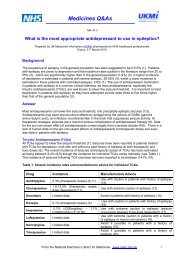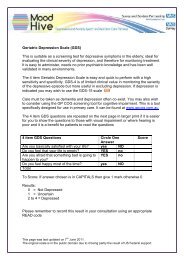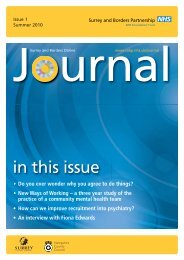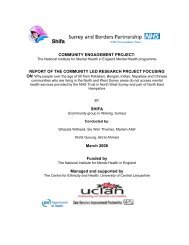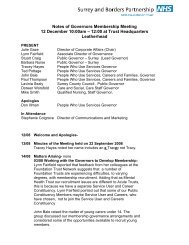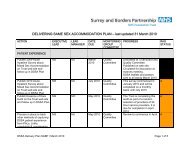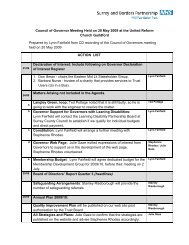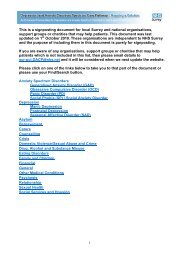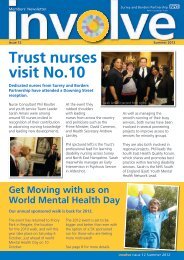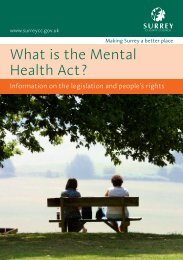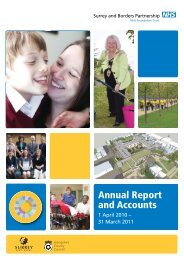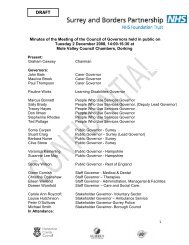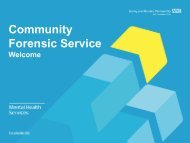Appendix 1 – Template for NHSD Q&As
Appendix 1 – Template for NHSD Q&As
Appendix 1 – Template for NHSD Q&As
You also want an ePaper? Increase the reach of your titles
YUMPU automatically turns print PDFs into web optimized ePapers that Google loves.
<strong>NHSD</strong> Q&A N12.3<br />
Which antidepressants interact with alcohol?<br />
Expiry: 31st March 2010<br />
This document is suitable <strong>for</strong> use as the sole source of in<strong>for</strong>mation<br />
Summary<br />
♦<br />
♦<br />
♦<br />
Alcohol should be used with caution in individuals taking any antidepressant because of<br />
the risk of potentiating the side effects of these medicines, particularly sedation and<br />
psychomotor impairment. If alcohol is consumed it should be in moderation.<br />
All antidepressants can potentially impair the per<strong>for</strong>mance of skilled tasks, including<br />
driving. Since alcohol can make this worse, it is advisable to warn callers against drinking<br />
alcohol with any antidepressant if they intend to drive.<br />
Tyramine-containing non-alcoholic and alcoholic drinks e.g. wine, beer, sherry and lager<br />
present a particular problem to those taking MAOIs because of the risk of a hypertensive<br />
crisis and they should be avoided completely. This reaction is unlikely to occur with the<br />
reversible MAOI, moclobemide.<br />
For further in<strong>for</strong>mation see below<br />
Background<br />
Antidepressants have a variety of side effects that might be made worse by alcohol <strong>–</strong> e.g.<br />
sedation, dizziness and impaired psychomotor skills. There<strong>for</strong>e ‘avoid alcohol’ may be<br />
included as a cautionary label on the medicinal product. This Q&A addresses the extent to<br />
which an interaction between alcohol and an antidepressant might affect a person.<br />
The main groups of antidepressants are:<br />
1. Tricyclic antidepressants (TC<strong>As</strong>) <strong>–</strong> e.g. amitriptyline.<br />
2. Monoamine-oxidase inhibitors (MAOIs) <strong>–</strong> e.g. phenelzine.<br />
3. Selective serotonin re-uptake inhibitors (SSRIs) <strong>–</strong> e.g. paroxetine.<br />
There are also some other antidepressants which do not fit into the above groups; they<br />
include venlafaxine, mirtazapine, duloxetine and reboxetine.<br />
Answer<br />
Tricyclic antidepressants (TC<strong>As</strong>)<br />
Additive effects of alcohol and the TCA may lead to increased sedation and psychomotor<br />
impairment particularly with amitriptyline (1,2). This effect may be worse in the first few weeks<br />
after therapy is initiated (2). It may be appropriate to recommend that callers abstain from<br />
drinking alcohol <strong>for</strong> at least the first few weeks of TCA administration to assess an individual’s<br />
reaction to the wide range of potential side effects. Increased sedation is also possible with<br />
related antidepressants: mianserin and trazodone (2).<br />
Monoamine-oxidase inhibitors (MAOIs)<br />
People taking MAOIs must avoid tyramine containing foodstuffs or they risk a severe<br />
hypertensive crisis because of an interaction with tyramine. Some non-alcoholic and
alcoholic drinks contain tyramine e.g. red and white wine, beer, sherry and lager. Avoidance<br />
of tyramine-containing drinks whilst taking these antidepressants is advised (2). However, no<br />
serious reaction is likely between alcohol and the reversible MAOI, moclobemide (2).<br />
The hypotensive side-effects of the MAOIs may be exaggerated in a few people by alcohol,<br />
and they may experience dizziness and faintness after drinking relatively modest amounts (2).<br />
Selective serotonin re-uptake inhibitors (SSRIs)<br />
There is evidence that fluoxetine does not interact with alcohol (2). Similarly, sertraline,<br />
citalopram and escitalopram seem unlikely to significantly potentiate cognitive or psychomotor<br />
side effects associated with alcohol consumption (2,3). There may be a modest increase in<br />
the sedative effects of alcohol in people taking fluvoxamine or paroxetine (2). Manufacturers<br />
of this group of medicines still advise that alcohol should be avoided whilst taking the SSRIs<br />
(3), but see summary <strong>for</strong> practical advice.<br />
Other antidepressants<br />
Venlafaxine does not significantly potentiate the psychomotor effects associated with alcohol<br />
consumption (2,3) neither does reboxetine or duloxetine (2,3). However, the manufacturers of<br />
venlafaxine still advise people to avoid alcohol (3).<br />
Mirtazapine has been shown to accentuate the psychomotor impairment related to alcohol<br />
consumption, and people should be cautioned about operating or driving motor vehicles whilst<br />
taking the combination (2,4). The manufacturer advises avoiding alcohol while taking<br />
mirtazapine (3).<br />
Limitations<br />
This in<strong>for</strong>mation relates to United Kingdom products only. This in<strong>for</strong>mation only covers<br />
antidepressants and in<strong>for</strong>mation available at the time of preparation. It is recommended that<br />
the Government’s limits on consumption of alcohol are not exceeded. Immediate specialist<br />
advice should be sought where individuals have consumed more than their prescribed daily<br />
dose of antidepressant or who may have taken an overdose.<br />
References<br />
1. Anon. How important are drug-alcohol interactions? Drugs and Therapy Perspectives<br />
1998; 11:13-16.<br />
2. Baxter K, editor. Stockley’s Drug Interactions. London. Pharmaceutical Press. Electronic<br />
version, 2008. Accessed via www.medicinescomplete.com on 22/1/08.<br />
3. Summary of Product Characteristics (various). Accessed via http://emc.medicines.org.uk<br />
on 22/1/08.<br />
4. Klasco RK (Ed): Drug-Reax® system. Thomson Micromedex , Greenwood Village,<br />
Colorado, USA. Available by subscription at: http://www.thomsonhc.com/ (cited 22/1/08).<br />
Keywords<br />
Amitriptyline, clomipramine, dosulepin, doxepin, imipramine, lofepramine, nortriptyline,<br />
trimipramine, mianserin, trazodone, trancypromine, isocarboxazid, phenelzine, moclobemide,<br />
paroxetine, fluoxetine, citalopram, escitalopram, duloxetine, venlafaxine, mirtazapine,<br />
reboxetine, antidepressants, antidepressants-tricyclic, monoamine oxidase inhibitors,<br />
serotonin reuptake inhibitors, Triptafen, Anafranil, Prothiaden, Sinepin, Allegron, Surmontil,<br />
Molipaxin, Nardil, Manerix, Cipramil, Cipralex, Prozac, Faverin, Seroxat, Lustral, Cymbalta,<br />
Edronax, Efexor, Zispin, drug interactions, alcohol, alcoholic beverages.<br />
Quality <strong>As</strong>surance<br />
Prepared by<br />
Gail Woodland, Senior In<strong>for</strong>mation Pharmacist, Welsh Medicines In<strong>for</strong>mation Centre<br />
Date Prepared<br />
12 th February 2008
Checked by<br />
Fiona Woods, Director, Welsh Medicines In<strong>for</strong>mation Centre<br />
Date of check<br />
16 th March 2008<br />
Search strategy<br />
• Embase (exp antidepressive agent/ AND [drug interaction AND exp alcohol OR Drug<br />
alcohol interaction*], limit human and year 2005 to 2008)<br />
• Medline (exp antidepressive agents AND drug interactions AND/OR exp ethanol, limit<br />
human and year 2005 to 2008)<br />
• IDIS ([“antidepressants-tri/tetracyc 28160600” OR “antidepressants-MAO inhib<br />
28160500” OR “antidepressants-other 28160400” OR “antidepressants-SSRIs<br />
28160700”] AND “alcohol 28081231”, Descriptors: “drug interaction 50” OR “drug<br />
combination 16”, limit 2005 to 2008)<br />
• MicroMedex (DrugDex and Martindale)<br />
• Medicines Complete (Stockley’s Drug Interactions)<br />
• Pharmline (alcohol and antidepressants)



